Oscar-winning writer argues why all Americans should care about prison reform
Like most of America, Oscar-winning filmmaker John Ridley doesn’t spend a lot of time acting on prison reform — but he knows that it matters.
“I’ll be honest: Criminal justice reform as a singular topic is not something that I completely work with,” Ridley, best known for writing the critically-acclaimed film “12 Years a Slave,” told Yahoo Finance. “But one thing I would say to people is criminal justice reform for some folks is something they look at and go, ‘Okay well, maybe the system might be broken a little bit, but that doesn’t affect me. It affects these folks over there and that’s too bad. But what am I going to do?’”
Speaking in Milwaukee on the sidelines of Team Up for Change, an initiative spearheaded by the NBA’s Milwaukee Bucks and Sacramento Kings organizations, Ridley laid out an argument for why all Americans should care about reforming the current system.
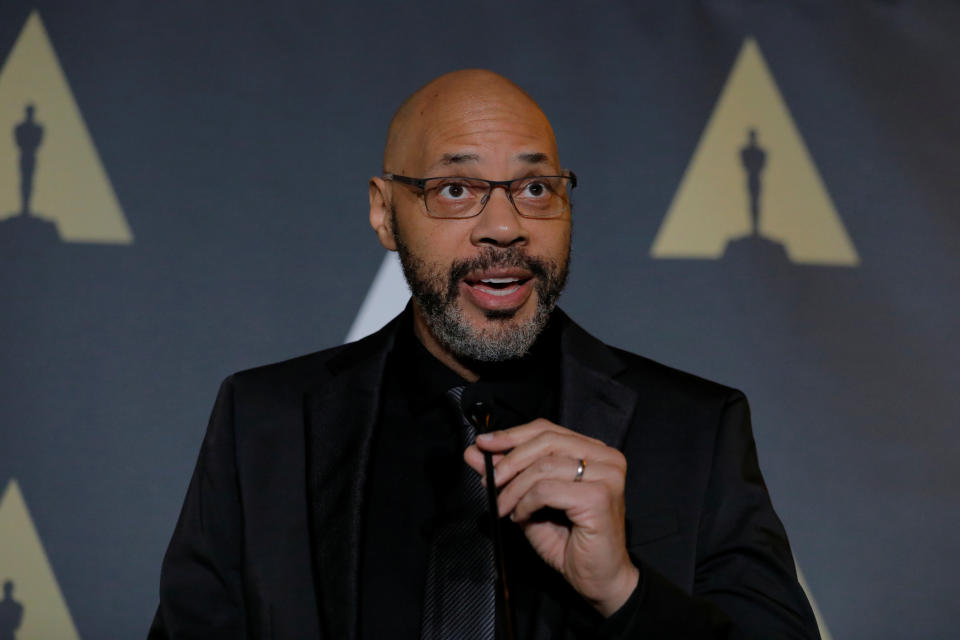
“It is only a matter of time before that inequality comes back and reaches people,” he said. “If you’re white, you might feel like, ‘Oh yeah well it’s bad, but that largely happens to people of color.’ But what if you’re a white person and you don’t have much economic means? How does that affect you?”
According to the Sentencing Project, Blacks make up 38% of the prison population, while 21% are Hispanic and 35% are White. And “in twelve states, more than half of the prison population is African American.” Overall, the U.S. has the highest number of incarcerated individuals, with over 1.3 million people imprisoned across the country.
In New Jersey, Wisconsin, Iowa, Minnesota, and Vermont, the rate of black imprisonment is more than 10 times that for whites. Here’s a look at U.S. black/white incarceration ratios by state:
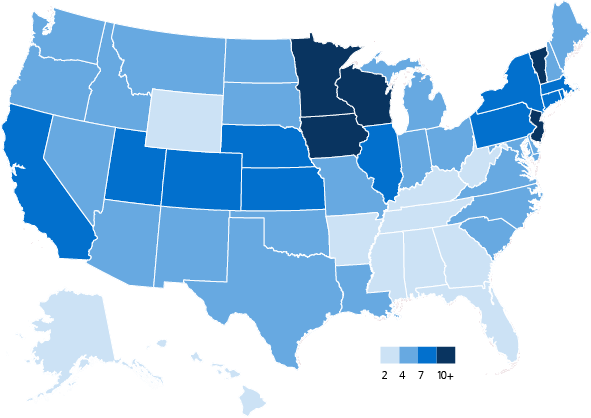
Ridley also spoke on a panel following the screening of Just Mercy, a film based on a true story of a black man who was imprisoned and sent to death row for a crime he did not commit.
“If you’re a man, you may think, ‘I’m a man, and I’ve got certain privileges and that happens to other people, or something happens to women,’ Ridley said. “But anything can come around and boomerang on people. And if any of us are waiting until we find ourselves caught up in inequality to speak to equality, then it’s too late. And it does affect everybody.”
There’s no right answer when it comes to trying to solve this issue, according to Ridley, since there’s a myriad of factors at play. Consequently, the first step is awareness.
“You can be holistic and say, ‘As people, we’ve got to do better,’” he said. “You can be crass and say, ‘Hey, where are my tax dollars going and why is it so much of my income or after-tax income is going to prisons or prison reform?’ I think as a country, we’re starting to learn the overall impact, but we’ve got a lot of unwinding to do.”
Segregation and inequality
Ridley's comments land in context of Milwaukee wrestling with these issues as the most segregated city in the U.S.
Data shows that Blacks make up 55.4% of the population in Milwaukee’s West Side neighborhood, with the median income bracket at $10,000 to $19,999.
“We have people on the West side, some of them have never been to the Lakefront, never even go to that part of town because they feel like it’s not theirs,” Ridley said. “We have some people who are on the East side, who certainly do not want to go to the West side because they just feel like that’s a whole other territory and doesn’t relate to them. So there’s this middle ground and for me, entertainment has always been a middle space.”
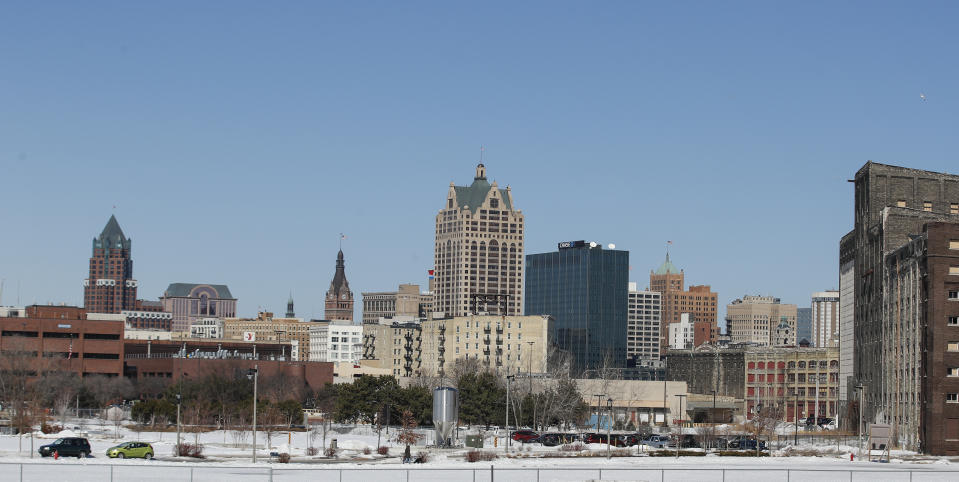
Ridley has seen the power of second chances first-hand: During his time in Hollywood, he’s encountered Homeboy Industries, a non-profit organization that works with formerly incarcerated or gang-involved men and women. One of its employees was Father Greg Boyle, a Jesuit priest.
“[He] started working with young men and women who had been previously incarcerated,” Ridley said. “Most of them had come from gangs, and he was really working with them coming out of prison to let them know they have value, that they have probably been traumatized in life, that it’s ok to to admit it and to have feelings, and it’s ok to cry.”
Ridley was able to work with one of the men who came out of Homeboy Industries.
“Five or six, seven, eight years ago, this young man might have pulled a gun on me, might have tried to jack me, might have tried to steal from me,” Ridley said. “And when I met him, all he wanted was to be a working actor. All he wanted was to not just change his life, but then to use his platform he had to change other lives.”
‘27% of prisoners at that age’
Wealth inequality has been a constant in the U.S. And racial inequality is part of that the reality.
In 2016, White families had a median family wealth of $171,000, while Black families were at just $17,600 and Hispanic families were at $20,700, according to data from the Federal Reserve. And, even though the net worth of Black families rose between 2013 and 2016, “the white-black gap in median net worth increased from $132,800 in 2013 to $153,500 in 2016.”
Unfortunately, the poorer you grow up, the more likely you are to end up incarcerated, according to Brookings Institution research, which estimated that “almost one in 10 boys born to lowest-income families are incarcerated at age 30 and make up about 27% of prisoners at that age.”
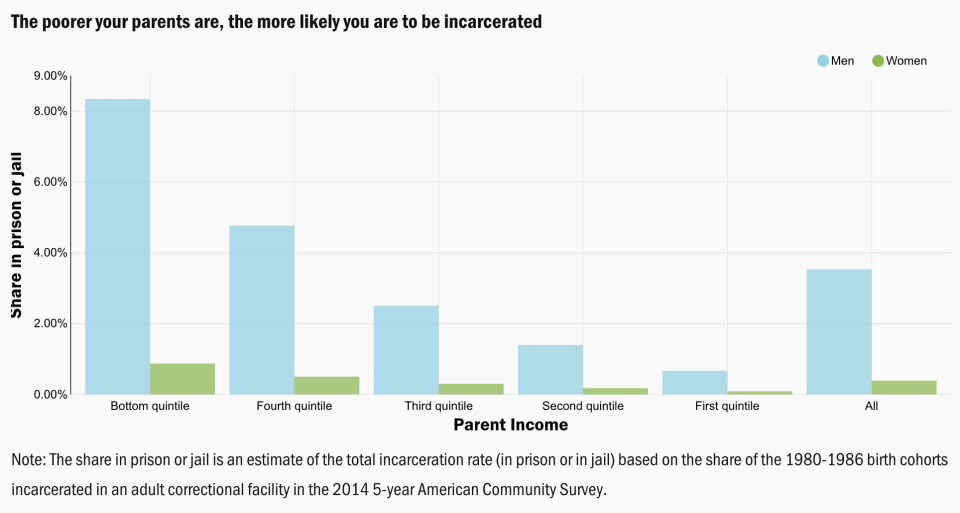
‘We’ve got to a better job’
Prison reform is one place to start to address income inequality, Ridley noted, particularly in the form of reducing the sentences of non-violent offenders. Kim Kardashian West has consistently raised awareness on this issue by advocating for President Trump to grant clemency in case featuring non-violent drug offenses.
“We have been in an equitable space, really since our existence, but when one looks at how laws were implemented, one looks at criminal justice reform that happened maybe in the ‘90s, when it was more punitive than rehabilitative, we’ve got to start asking if we’re locking up everybody,” Ridley said. “The most violent of violent offenders is not the same as the kid who got picked up for marijuana. Somebody who visits violence in a repetitive fashion towards anyone is not the same as someone who’s made a horrid mistake at a young age and has the potential to really change.”
Part of the issue is the existence of mandatory minimums. According to the Criminal Justice Policy Foundation, “mandatory minimum sentencing laws force a judge to hand down a minimum prison sentence based on the charges a prosecutor brings against a defendant which result in a conviction — usually a guilty plea.”
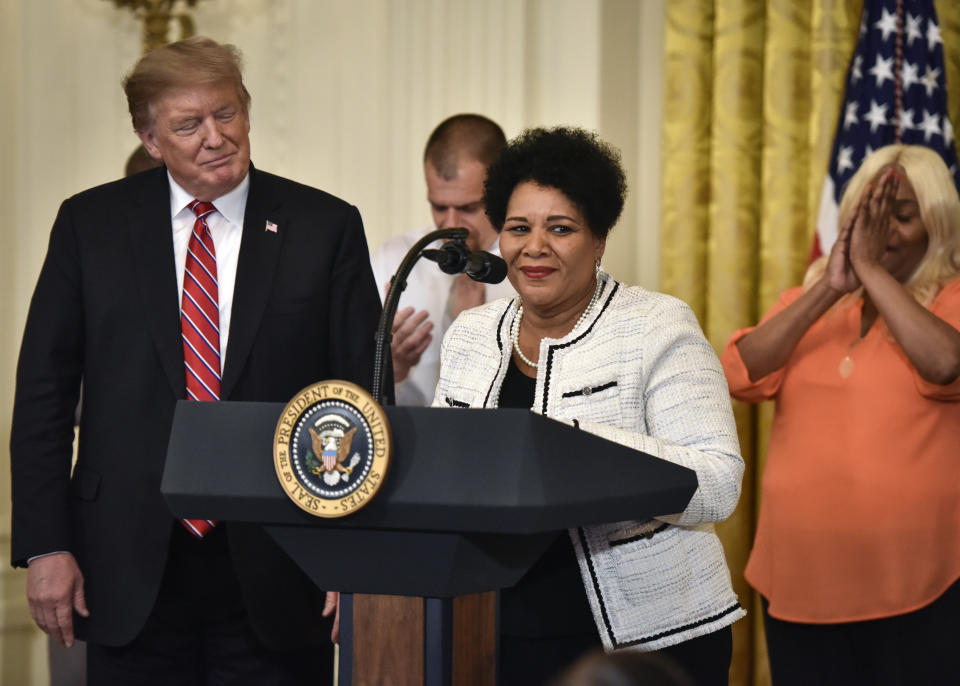
Mandatory minimums often apply to non-violent drug offenders, which contributes to the overall problem of mass incarceration in the U.S.
“We’ve got to do a better job,” Ridley said. “I certainly will not pretend to be an expert, but one thing I do understand and one thing I think all of us understand is an inequitable system. While we would agree on what that inequality is, we have more work to do on really figuring out how we implement a better system from arrest, through prosecution, through adjudication, through rehabilitation.”
Ridley stressed that “if people are waiting til it visits them, then it’s too late to complain. It’s too late to want better. It’s too late to want your sense of justice if it’s not working for everybody out there.”
Adriana is a reporter and editor for Yahoo Finance. She can be reached at adriana@yahoofinance.com. Follow her on Twitter @adrianambells.
READ MORE:
Follow Yahoo Finance on Twitter, Facebook, Instagram, Flipboard, SmartNews, LinkedIn, YouTube, and reddit.


